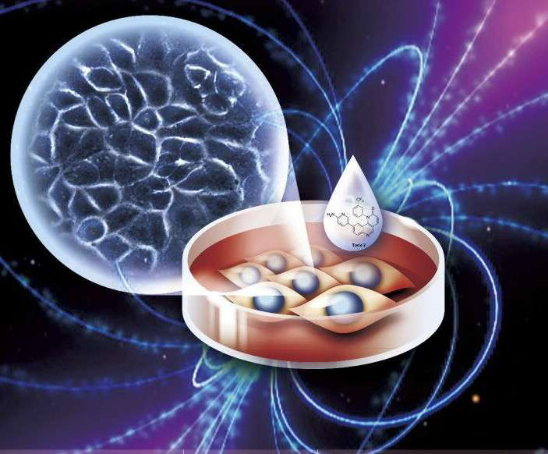With the development of modern appliances, including MRI machines in the hospitals, concerns to the potential impact of magnetic fields on human health have arisen. It is found that static magnetic field can affect cell proliferation in a cell-type and intensity-dependent way, of which the mechanism, however, remains unclear.
Researchers in the High Magnetic Field Laboratory of the Chinese Academy of Sciences (CHMFL) found that Epidermal Growth Factor Receptor (EGFR), a protein that is over expressed and highly activated in multiple cancers, can be directly inhibited by static magnetic field.
Using Liquid-phase Scanning Tunneling Microscopy and molecular dynamics simulation, they found that the alignment of EGFR kinase domain can be affected by 1-9 T static magnetic fields in an intensity-dependent manner, which may interrupt inter-molecular interactions between EGFR monomers that are critical for their activation. Correspondingly, ultra-strong 9 T magnet evidently inhibited EGFR-expressing cancer cell growth.
Besides, researchers found that 1 T static magnetic field can affect microtubules in cells that are the fundamental components in mitotic spindle and play essential roles in cell division. Combining static magnetic field with chemodrugs, they found that SMFs can increase the antitumor efficacy of 5-FU or 5-FU/Taxol in four different cancer cell lines.
In addition, due to the feedback reactivation of other signaling components, the clinical effects of the most mTOR inhibitors are limited. The study found that 1 T static magnetic field could increase the inhibition efficiency on mTOR substrates and repress mTOR inhibitor-induced feedback reactivation of EGFR and Akt, thus increase the antitumor efficacy of mTOR inhibitor Torin 2.
These findings show that static magnetic fields not only inhibit the growth of cancer cells, but also increase the antitumor efficacy of some chemodrugs. Further studies are expected to reveal the clinical potentials of static magnetic fields in cancer treatment.
This work was jointly done by Dr. XIN Zhang’s group, Dr. LU Qingyou’s group and LI Guohui’ group. And the findings were published in Oncotarget with title Moderate and strong static magnetic fields directly affect EGFR kinase domain orientation to inhibit cancer cell proliferation, Bioelectrochemistry with title Moderate intensity static magnetic fields affect mitotic spindles and increase the antitumor efficacy of 5-FU and Taxol. and Science Bulletin with title 1 T moderate intensity static magnetic field affects Akt/mTOR pathway and increases the antitumor efficacy of mTOR inhibitors in CNE-2Z cells.
The work was funded by National Natural Science Foundation of China.

Fig.1. 1-9 T static magnetic fields interrupt inter-molecular interactions between EGFR monomers to inhibit EGFR-expressing cancer cell growth (Image by the study team)

Fig.2. 1 T static magnetic field increases the antitumor efficacy of mTOR inhibitor Torin 2. (Image by the study team)
ZHANG Xin
High Magnetic Field Laboratory of the Chinese Academy of Sciences (http://english.hmfl.cas.cn/)
350 Shushanhu Road, Hefei, Anhui, P.R.China, 230031
Tel: 86-551-65593356
Email: xinzhang@hmfl.ac.cn
 Tel: +86-551-65591206
Tel: +86-551-65591206
 Fax: +86-551-65591270
Fax: +86-551-65591270
 Emai: zhous@hfcas.ac.cn
Emai: zhous@hfcas.ac.cn
 350 Shushanhu Road
350 Shushanhu Road